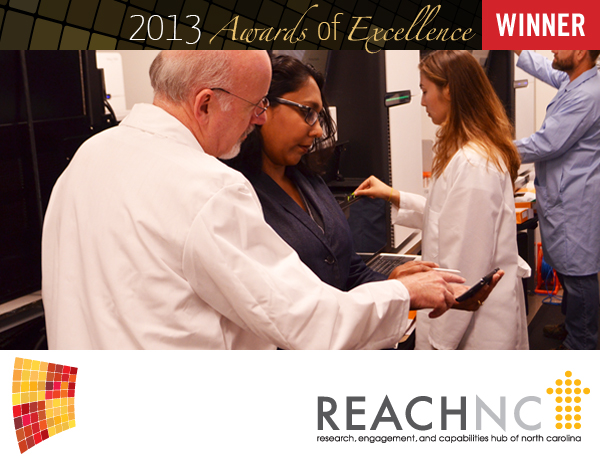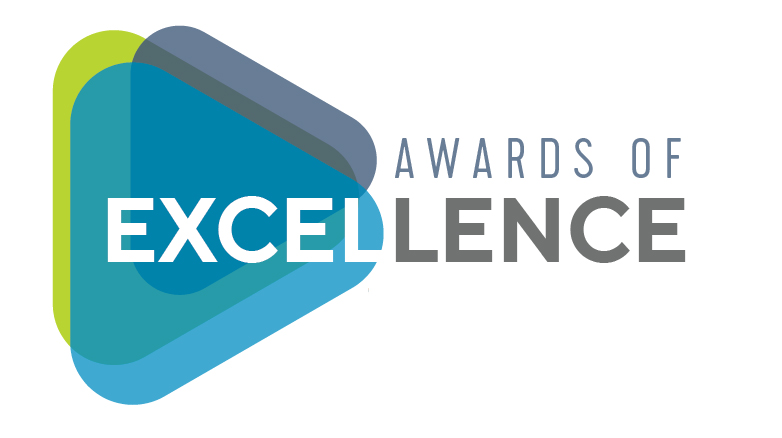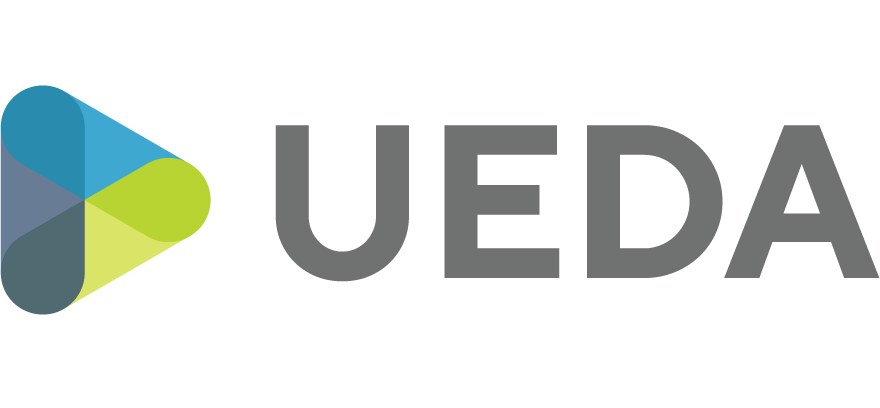Network

| Award Category: | Leadership and Collaboration |
| Project Site: | Research, Engagement, and Capabilities Hub of North Carolina (REACH NC) |
| Submitted By: | North Carolina State University & University of North Carolina Chapel Hill |
| Contact: | Sharlini Sankaran, 919.445.9634 |
Case Study
Abstract
REACH NC is a publicly accessible and searchable web-based portal that uses advanced technologies to enable quicker and easier location of faculty experts in North Carolina. The uniqueness of REACH NC lies in the partnership of public and private universities and research institutes to make the portal and REACH NC brand and mission a truly statewide effort. New features under development will allow users to search for core laboratories, equipment, and other assets. Unlike other similar portals, REACH NC includes experts not only from the biomedical sciences but from a broad range of disciplines including social science, education, and business. The initiative was launched by the University of North Carolina at Chapel Hill and North Carolina State University with support from University of North Carolina General Administration, and has since been expanded to include 13 other North Carolina public universities, Duke, and RTI International. REACH NC now contains over 8,300 expert profiles representing these 17 institutions. REACH NC aims to act as a ‘one stop portal’ to enable quicker and more effective location of experts for collaborative opportunities for internal and external partners. Private companies, economic development agencies, and university faculty and staff have utilized REACH NC to find partners for collaboration on research projects and proposals, obtain technical assistance or consulting, showcase statewide expertise for economic development, and find speakers, reviewers, and mentors.
Problem/Background
REACH NC is a statewide project that allows North Carolina to tap into its own vast pool of experts and resources. Until REACH NC, researchers, administrators, business leaders, and others trying to find experts and assets or to assess the state’s expertise and capabilities in a field had to depend on their own social networks or pore through multiple online systems. To quote an economic developer at East Carolina University, “For years, the cycle from the call to the connection took a number of phone calls to deans, department chairs, professors and administration to ascertain the best match for the inquirer. These calls could span over several days to find the right expert...” REACH NC has reduced this search time to minutes by making available detailed information about faculty expertise – publications, grants, patents, collaborative partners, and other data – to help faculty members, university administrators, the business community, economic developers, and the general public better locate where expertise in a particular subject area resides and how they can access it. Our goals are to increase transparency of research activity and capabilities across the state and to provide opportunities for those inside and outside academia to access researcher expertise and assets easily. In order to execute this complex and technically challenging project, REACH relies upon collaboration amongst multiple academic, non-profit, and economic development agencies across North Carolina.
The initial REACH NC partnership was formed when North Carolina State University, UNC-Chapel Hill, and the Renaissance Computing Institute (RENCI) received startup funding from UNC-Chapel Hill Translational Clinical Sciences (TRACS) institute, the UNC System General Administration and Duke University, along with creative input from UNC-Chapel Hill’s Office of Research Information Systems, to launch an expertise profiling project. Additional funding has been received from UNC General Administration, the North Carolina Biotechnology Center, TUCASI/ Research Triangle Foundation, and the Golden LEAF Foundation. The portal was launched in May 2011 with expert profiles from UNC-Chapel Hill and NC State. Since then, REACH NC has been expanded to include profiles from Duke University, fourteen other UNC system institutions, and RTI International, a nonprofit research institute based in North Carolina. REACH NC plans to expand to include other North Carolina private universities and research institutions, as well as additional capabilities to search for facilities and equipment and possibly student internships. REACH NC currently contains over 8,900 expert profiles representing 17 North Carolina institutions. Four of these institutions are current UEDA members: NC State University, UNC-Chapel Hill, UNC Greensboro, and East Carolina University.
Solution
A REACH NC pilot was created in 2010 representing expertise at UNC-Chapel Hill and NC State University. Interest in the pilot initiative and its potential attracted the funding needed to expand the portal. Financial support from economic development agencies was particularly notable and directly responsible for the ability to pursue portal build-out throughout 2011. In January 2012, expertise profiles from an additional 13 UNC institutions were added to the portal; in June 2012, profiles from Duke University and pilot profiles from RTI were also added. Continuous improvements of the portal include the addition of a “Contact Us” form, which allows us to track inquiries and follow up on their progress, as well as external evaluation of portal usage and outcomes. Our goal is for REACH NC to be as comprehensive as possible and to accomplish this in as automated a way as possible. We have made tremendous strides in technical developments towards this goal.
It became quickly apparent that the success of REACH NC would depend on input from a wide variety of stakeholders, and the issues involved in the build-out of this data intensive portal were complex. In mid-2012, two organizations were formed to enhance governance and decision-making for REACH NC. The REACH NC Operations Council advises on the technical direction and functionality of the portal and is comprised of campus leaders in a variety of relevant roles (legal, human resources, library services, information technology, etc.). The REACH NC Executive Council advises on the sustainability of the portal and is comprised of leaders external to the campuses (NC Department of Commerce, Research Triangle Park, etc.).
The uniqueness of REACH NC lies in the partnership of a large number of institutions coming together to launch this ambitious and technologically complex project – including public universities, a private university, and a nonprofit research institute. NC State University, UNC-Chapel Hill, and Duke University provided the initial impetus for a statewide implementation of a commercial software program that was typically used for a single institution and a narrow range of research. With the added leadership of the University of North Carolina System and support of economic development organizations, an additional 14 public universities statewide were able to join REACH to create the largest known such multi-institutional database.
Results
Broadly speaking, the assistance provided by REACH NC can be grouped into several categories:
Seeking experts to build teams and partnership. To date, REACH NC has served several economic development and university audiences as a tool to: locate experts in particular content areas, connect researchers with each other, connect researchers with businesses and the military and vice versa, matching interns or junior investigators with faculty who might serve as mentors, and assemble teams of collaborators for a variety of purposes—such as combining areas of expertise to develop a new product, conducting research in identified populations, and applying for grant funds.
Promoting economic development in North Carolina. Organizations such as the North Carolina Department of Commerce, the North Carolina Biotechnology Center, the Small Business and Technology Development Center, and university-based economic development offices have used REACH NC to help identify new markets and businesses and recruit business and industry to North Carolina. Users at NC State University have used REACH NC to demonstrate the level of relevant expert resources as part of their strategy to encourage businesses to select North Carolina as a site for operations.
A resource for communications about faculty work and publications. University administrators use REACH NC to review current faculty activity —for example, recent publications or new research projects—that can be highlighted in newsletters or other university-based publications. One spoke of checking the site at least once a week for updates on faculty activities, noting that “before REACH NC there wasn’t anything” to help with this type of search.
Identifying experts as presenters, reviewers, and resources for legislative or media queries. University administrators and communications officials have used REACH NC to identify conference speakers or presenters for workshops who have the appropriate area of expertise and to locate reviewers of grant proposals. REACH NC has also been used to locate relevant experts when an institution is called on by media and members of the legislature who ask, “Who can talk to us about ‘X’?”
Compiling reports and summaries of faculty research and product. REACH NC has been helpful in generating reports that were required for various purposes, including accreditation studies, faculty productivity reports, and tracking benefits accruing as a result of grants that were awarded. One user who administers grant programs explained, “I track everything (grantees) published and funding that grantees got for their lab” as a result of grants awarded. “With REACH NC, I can easily look for this information.” Another noted that in preparing reports, “What used to take four hours now takes 20 minutes (with REACH NC).” One used REACH NC to generate the information for graphic representations of what researchers are working on in particular areas of study.
One specific case is the regular use of REACH NC by UNC General Administration staff to connect the local North Carolina defense community — government and industry partners alike — with UNC experts. REACH NC has been used to
- Discover University subject matter experts to consult directly with Department of Defense personnel;
- Identify participants for meetings and workshops focused on technical topics of high interest to UNC systems’ military partners. As an example, the UNC system hosted a workshop in 2012 on “Human Domain Analysis”, which attracted over 150 attendees from government, academia and industry, to discuss cutting edge computational and quantitative approaches to understanding human dynamics. Another workshop brought together university researchers with Human Performance staff from the special operations community to discuss leading research in areas such as performance nutrition, endurance and strength conditioning, high altitude endurance, and physical therapy and rehabilitation;
- Identify University experts who can team with companies to pursue new contract and grant opportunities with the Department of Defense (DoD). In one example, the UNC system signed a multiple-campus Teaming Agreement with a prime contractor on a proposal for a large R&D contract with a DoD agency after using REACH NC to pull together a UNC team relevant to the performance on the contract; and
- Find academic experts at UNC system campuses who have partnered with small companies to pursue defense-related Small Business Innovative Research (SBIR) and Small Business Technology Transfer (STTR) contracts.
Many visitors from around the world are now aware of the REACH NC brand and accessing the web portal to locate experts. Over 213,000 unique visitors (81% of all site visits) representing at least 20 countries have visited REACH NC over the past year. Site traffic has increased dramatically over the past year, with a peak of 8,895 visits week of March 24, 2013 compared to 1,017 visits the same week in 2012. In May 2012, we implemented a brief contact form to better personally serve those seeking collaboration with NC experts. Since the form was implemented, we have received nearly 200 inquiries seeking experts from various disciplines. The inquiries range from requests for collaborations on research projects, to requests for experts to partner and consult on economic development issues. The number of inquiries has also continued to rise: averaging 5 – 6 per week. The contact form is only one avenue for users to seek collaboration; many choose to place a phone call or send an individual email to contact experts.
Regular users of REACH NC report positive experiences for themselves and for clients they have worked with. They describe REACH NC as “a great tool,” “functional and easy to use,” “a wonderful example of what the higher education system can bring for job creation,” “well-received,” “positive, useful, and a step forward.” University administrators note how REACH NC has “impacted staff productivity” by reducing the time it takes to research information for reports. They also note that the full impacts of partnerships formed through REACH NC are yet to be realized.
Future Considerations
REACH NC will continue to play an important role in establishing and growing relationships between university research expertise and industry and non-academic partners, such as the ones illustrated in this response. Since the initial rollout of expert profiles from NC State University and UNC-Chapel Hill, the initiative has been successfully scaled across 14 more campuses and one nonprofit research institution. The key to scalability across campuses was achieving early buy-in from university administrators and other personnel responsible for economic development and outreach at the respective campuses. In terms of replicability, REACH NC and University of North Carolina System personnel have had ongoing conversations with at least four states which are planning to implement a similar statewide expert profiling system.
REACH NC is sustainable from a technical standpoint because the creation and maintenance of expert profiles requires minimum manual entry or upkeep from faculty members or administrators. We continue seeking publicly-available, automated sources of information for profiles. We are also continuously developing ways to improve and automate routine updates such as personnel listings. REACH NC relies on a team of campus liaisons to gather personnel updates and to engage faculty members and university administrators to ensure that the information that is presented is up-to-date and accurate.
The REACH NC Executive Council has been formed to address financial sustainability and to secure long-term funding for the project. The Council consists of representatives from the three initial partners (NC State, UNC-Chapel Hill, Duke University), the UNC System, and economic development organizations including Research Triangle Park, North Carolina Biotechnology Center, and the North Carolina Department of Commerce. The Council has met twice in the past year to review REACH NC’s budget and begin to formulate a plan for financial sustainability of the project.
The REACH NC brand is growing to incorporate additional services such as the equipment and facility finder and a proposed internship matching portal. The equipment and facility finder is in development and targeted for rollout in early 2014. This diversification of services, along with continued growth and utility of the expert profiles, will help ensure long-term sustainability of REACH NC as a portal to access university expertise, resources, and services.
Finalist Presentation
UEDA Awards of Excellence Finalists presented at the Annual Summit in Pittsburgh on October 28, 2013. Summit attendees then voted for the best initiative in each category.

